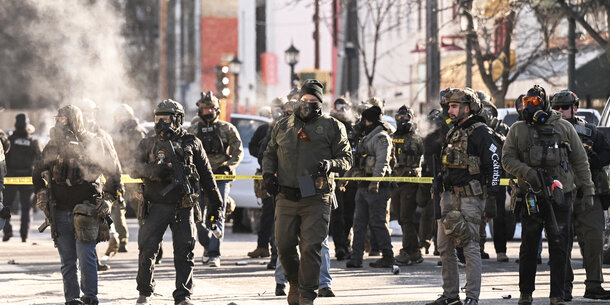After years of Trump administration threats against the International Criminal Court, the president declared a national emergency this month so he could impose sanctions to intimidate the court out of pursuing investigations of Americans and nationals of some other countries. The move is a gross abuse of emergency powers, undermines the core American values of human rights and rule of law, and weakens our country’s standing internationally by alienating us from our allies.
If there were a prize for actions that simultaneously affront both domestic and international law, this executive order would certainly be a contender. But unfortunately, the law that President Trump invoked, the International Emergency Economic Powers Act (IEEPA), is so broad and subject to so few Congressional checks that guardrails are scant. This egregious action by the president is a cry for reforms.
Congressional debates during consideration of the law, enacted in 1977, show that it was to be used only in “rare and brief” emergency circumstances, not as a quick and easy way to score political points. However, it provides vast and flexible financial powers, and for that reason it has become one of Trump’s favorite tools to threaten perceived enemies.
During a trade war with China, he threatened to order all U.S. companies to leave China, and when questioned on his power to do so tweeted “try looking at the Emergency Economic Powers Act of 1977. Case closed!" Last year, he threatened to use the law to impose escalating tariffs on goods coming from Mexico to force it to control the number of migrants traversing that country to reach the U.S. border. And this year, he warned of sanctions against Iraq if it expelled U.S. troops following the assassination of Iranian general Qasem Soleimani.
Beyond mere threats, Trump has actually declared national emergencies that invoke the law eight times.
Once unlocked, its powers are sweeping. It allows the freezing of all property belonging to those sanctioned that is held by “U.S. persons,” which includes citizens, residents, and American businesses and organizations. And it can prohibit all U.S. persons from having any financial dealings with those who are sanctioned, with the possibility of steep criminal and civil penalties if they do so.
The ICC, established in 2002 and based in The Hague, is meant to try cases of individuals such as Ali Kushayb, a Janjaweed militia leader wanted for war crimes and crimes against humanity in Darfur who was transferred to the ICC to stand trial just this month. The United States is not one of the 123 members of the ICC, but it has been supportive of some of its endeavors over the years. Trump’s order mostly serves as a ham-handed warning to the ICC to try to dissuade investigations regarding America or its non-member allies or risk further consequences.
The Trump administration’s ire most immediately stems from inquiries into events that are connected to the Afghanistan conflict, as well as actions in Palestine. The court’s prosecutor is currently conducting an investigation that could result in cases against citizens of the United States or allies.
The Trump administration objects to any ICC claim to be able to exercise jurisdiction over Americans, or other non-party states. In his order, and in fulfillment of IEEPA’s requirements, Trump said the possible investigation, arrest, detention, or prosecution of U.S. or allied personnel by the court constitutes an “unusual and extraordinary threat to the national security and foreign policy of the United States.”
Whatever one’s views of what the ICC’s reach should be, emergency powers are not the proper way to express them. There is no reasonable interpretation under which the ongoing operations of a court which the United States has successfully engaged with across multiple administrations can be considered an emergency. At the same time, this aggressive action will only serve to diminish the standing of our country as a leader of the rules-based international order that benefits us immensely.
Trump’s order does not sanction specific people, such as ICC staff and supporters, but it opens the door for the secretary of state to do so as long as they arguably fit within the broad categories of delineated targets. These include foreigners deemed to “have directly engaged in any effort by the ICC to investigate, arrest, detain, or prosecute any United States or allied personnel without the consent of the United States” or the relevant ally. It also includes those who have “materially assisted, sponsored, or provided financial, material, or technological support for, or goods or services to or in support of” those activities.
Under the National Emergencies Act, which governs the use of IEEPA, the only way for Congress to terminate the “emergency” is by mustering a veto-proof majority, an extremely high bar. A bill that would remedy that is awaiting a full vote before the Senate, but it largely excludes IEEPA from its ambit.
One vast improvement to the law would be to require congressional approval for any sanctions program within a certain amount of time, perhaps six months. This would sensibly flip the current dynamic: congressional inaction would terminate the use of extraordinary powers rather than permitting it.
IEEPA’s powers are ones that the Constitution gives to Congress, and that Congress delegated to the president. It is past time for Congress to take those powers back.



